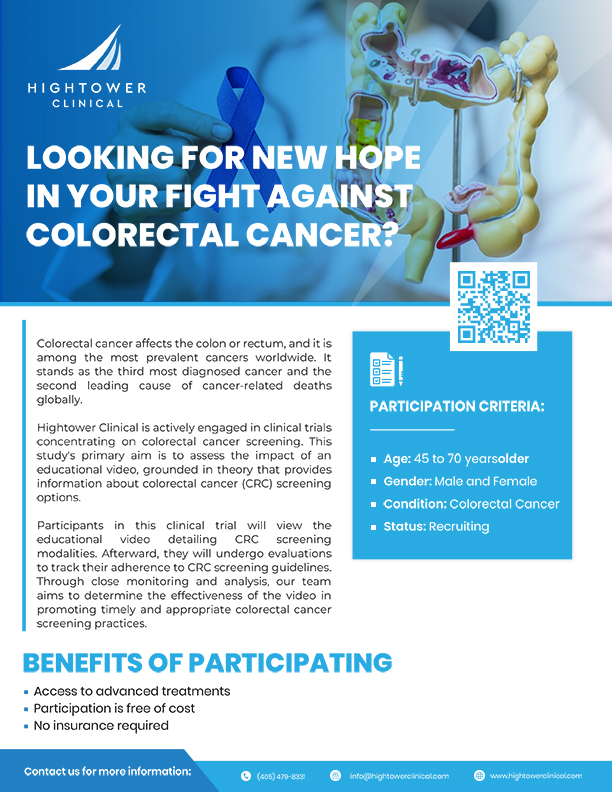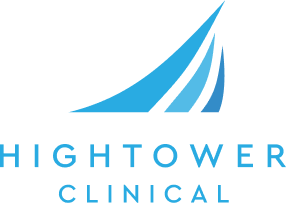Colorectal cancer diagnosis often involves a combination of tests like colonoscopy, imaging studies, and biopsies.
Colorectal Cancer Clinical Trials
Hightower is dedicated to advancing colorectal cancer clinical trials, striving to find treatments that work effectively for everyone.
Enroll Now
Gut Feeling Something's Wrong?
Colorectal cancer is a widespread and formidable disease, affecting the colon or rectum and often developing from precancerous polyps. It ranks among the most prevalent cancers globally, with over 1.9 million new cases diagnosed each year. Sadly, colorectal cancer also claims over 900,000 lives annually, underscoring the urgent need for effective interventions.
Despite these sobering statistics, early detection and advanced treatment modalities offer hope for improved outcomes. The 5-year relative survival rate for all stages combined stands at approximately 65%, reflecting the impact of timely diagnosis and comprehensive care.
Hightower is dedicated to advancing personalized care and innovative treatments for colorectal cancer. Our commitment to cutting-edge colorectal cancer clinical trials aims to elevate outcomes and improve the quality of life for individuals.
*Participation in the Clinical Trial is completely free of cost and is your choice.
*To participate, fill out the form, and someone from our research staff will call you to determine your eligibility for the Clinical Research Study.
The Fight Against Colorectal Cancer
Colorectal cancer is one of the most common cancers worldwide, affects the colon or rectum and typically develops from precancerous polyps. According to statistics, colorectal cancer ranks as the third most diagnosed cancer and the second leading cause of cancer-related deaths globally.
Recognizing the importance of early detection and intervention, Hightower clinical is conducting colorectal cancer clinical trials focused on colorectal cancer screening. This study’s main objective is to evaluate the impact of a theoretically grounded video that includes information about CRC screening modality choices on CRC screening rates and time adherent to CRC guidelines.
*All study procedures and study-related treatment, including the investigational drug, are free of cost, and insurance is not required to participate.
*The study doctor will take you through every step of the Clinical Trial before you decide to participate and will answer any questions you have about the study treatment.
What to Expect
If you decide to participate in the Clinical Trial for Colorectal Cancer, by filling out the form above, someone from the study team will contact you to determine your eligibility. The team will go over the study details with you to see if you meet the eligibility criteria for treatment for Colorectal Cancer.
You will be invited to the study location for screening if you meet the criteria. The study site will be within a 50-mile radius of your current location. The study doctors will advise you on the duration of the colorectal cancer clinical trials and the implications of your involvement in this research study. We invite you to ask as many questions as you like. After thoroughly explaining everything to the participants, they will be requested to sign an Informed Consent Form. We value transparency between our participants and investigators.
*Study-related care is offered at no charge. Expert physicians and healthcare professionals conduct thorough physical exams and assessments. *


Age
45 Years to 70 Years
Gender
Male & Female
Condition
Colorectal Cancer
Current Status
Recruiting
Unhealthy Gut Journey
Colorectal cancer is a stealthy foe, developing in the colon or rectum with minimal symptoms initially. It ranks among the most common cancers, posing significant challenges for patients and healthcare providers alike.
Symptoms may include changes in
- bowel habits
- rectal bleeding
- abdominal discomfort
- unexplained weight loss.
The impact of colorectal cancer extends beyond physical symptoms, affecting emotional well-being and overall quality of life.
Hightower’s dedication to advancing colorectal cancer research and treatments reflects our commitment to improving outcomes and supporting patients and their families throughout their journey.
Frequently Asked Questions
How to prevent colorectal cancer?
To prevent colorectal cancer, eat a healthy diet, exercise regularly, avoid smoking and excessive alcohol, and undergo recommended screenings as advised by your doctor.
How can I find colorectal cancer clinical trials?
You can find clinical trials for colorectal cancer by consulting with your healthcare provider, researching online databases, or contacting research institutions.




